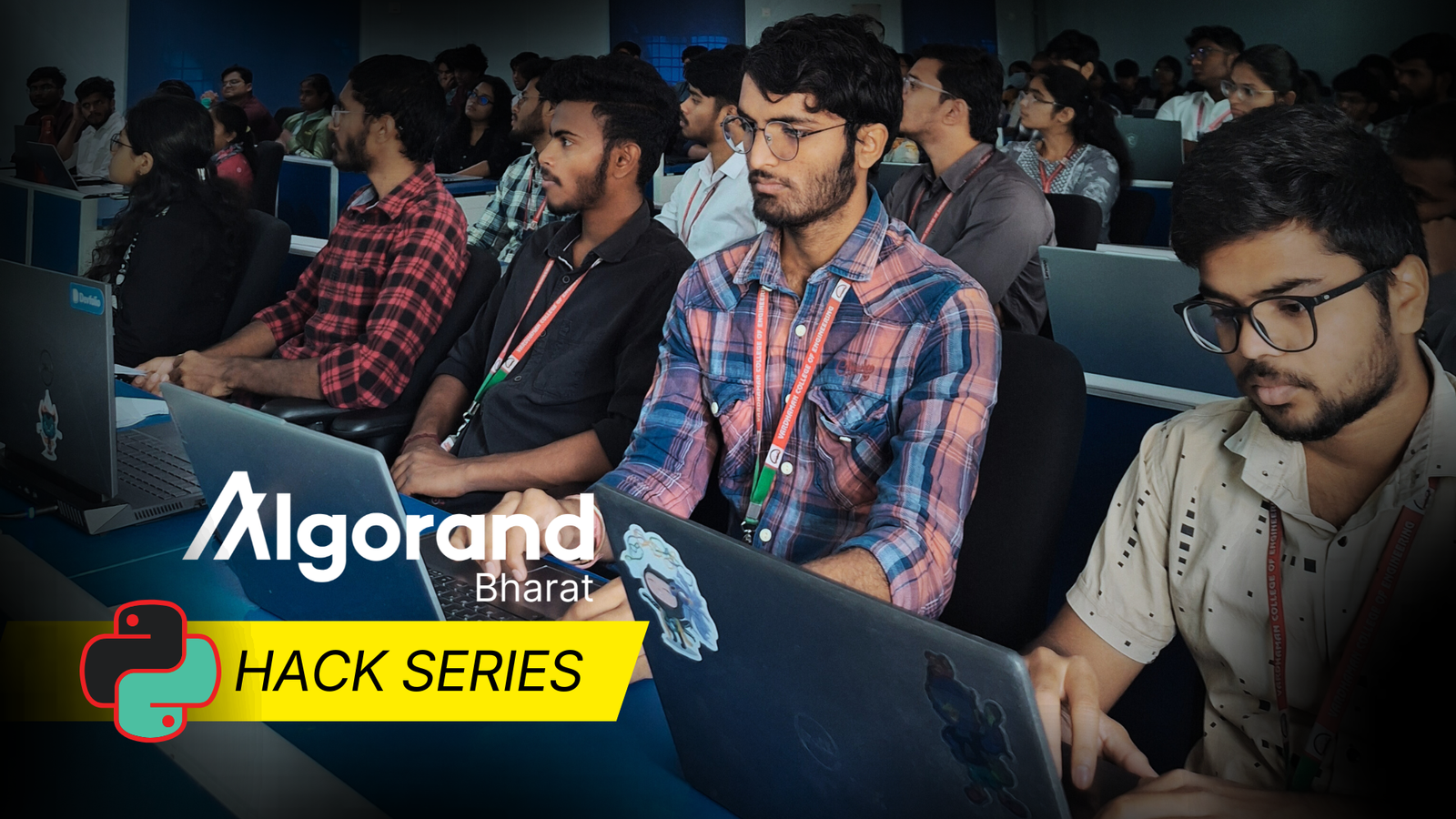
AlgoBharat 2025 Hack Series #1
We’re excited to announce our first AlgoBharat Hack Series, inviting and empowering participants to dive into the Algorand ecosystem. This first series offers four unique challenges to choose from, and the option to define your own project. Each of the tracks offers $2500 in cash prizes, for a total pool of $12,500. The top two submissions in each of the four defined challenges will receive $1,500 and $1,000; the top five submissions in the open competition will receive $500 each.
The competition kicks off on February 3, 2025, and will culminate with finalists pitching at a live AlgoBharat event in early June 2025. The Algorand team will lead virtual and live workshops and office hour sessions for all participants during the course of the competition. All participants in the Series agree to open source their project code and documentation under the MIT license at the conclusion of the competition, to be shared with the Algorand Foundation and the community to accelerate innovation and adoption.
Project submissions for the AlgoBharat Hack Series are now open! Submit your innovation by May 4 for a chance to showcase your skills and win big. 🚀
Important dates:
Phase 2 (Project Building)
March 1 – Apr 30: Developer workshops and office hour support
May 4th: Submission of GitHub Repository and video explanation of preliminary work
May 4th – May 15: Evaluation of submissions and semifinalist selection for each track
May 15: Semifinalists announced
Phase 3 (Semifinals)
May 15 – May 30: Development of use case (example) with your code
June 7: Submission deadline of Github repository and use case walkthrough video
Why Participate?
- Gain hands-on experience developing on the Algorand blockchain.
- Showcase your skills and creativity to a global audience.
- Contribute to the growth of the Algorand developer ecosystem.
- Earn recognition, networking opportunities, and $12,500 in cash prizes.
AlgoBharat Hack Series Info Sessions
To help you prepare, we launched the AlgoBharat Hack Series Info Sessions! If you missed them, you can catch up by watching the recordings on our AlgoBharat YouTube Channel.
Sessions Include:
Tracks
Bring Your Own Project (BYOP)
Context
The Bring Your Own Project (BYOP) initiative is for those developing their own innovative projects using Algorand’s blockchain technology. This track is ideal for developers, entrepreneurs, and innovators who want to showcase blockchain development skills in bringing their unique project idea to life. See our top 10 projects from 2024 at https://algobharat.in/devportal/.
Expectations
- Development on Algorand:
All projects must be built exclusively on the Algorand blockchain, utilizing AlgoKit Utils (Algorand Python and Typescript libraries) and infrastructure. Participants are encouraged to explore the unique capabilities of Algorand, such as fast transaction finality, low fees, scalability, and robust Layer-1 smart contract support. - Innovation and Creativity:
Participants are expected to propose and develop original project ideas that address real-world challenges or introduce innovative solutions. Projects can span various domains, including DeFi, gaming, NFTs, DAOs, supply chain, identity solutions, or any other creative use case leveraging Algorand. - Collaboration and Open Source:
At the end of the competition, participants agree to share their project code and documentation to ensure that the broader developer community can learn from, build upon, and benefit from their work.
Guidelines
- Project Scope:
- Projects should have a clear objective, defined use case, and measurable goals.
- Teams or individuals must document their development process, including challenges, solutions, and lessons learned.
- Technology Stack:
- Projects must leverage Algorand’s blockchain, utilizing AlgoKit Utils (Algorand Python and Typescript libraries).
- Developers are encouraged to integrate features like Algorand Standard Assets (ASAs), atomic transfers, and smart contracts in their projects.
Prize: $2500 total; $500 for each of the top five submissions.
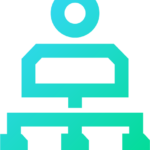

Consent Manager in Web3 using India’s Aadhaar and DigiLocker Infrastructure
Context
India’s Aadhaar and DigiLocker systems provide a foundation for identity verification and document storage. A consent manager leveraging these systems in a Web3 context could revolutionize data sharing by combining decentralized identity management with blockchain transparency.
Expectations
- Develop a consent management system that:-
- Allows users to securely share sensitive information/documents via Aadhaar and DigiLocker.
- Provides a mechanism for granting, revoking, and auditing consent.
- Ensures compatibility with self-sovereign identity (SSI) principles. - Integrate with Algorand’s blockchain for transparency and immutability.
- Focus on privacy-preserving techniques to protect user data.
Guidelines
- Study India’s Consent Manager framework (e.g., Account Aggregator model) and its integration with Aadhaar/DigiLocker.
- Research SSI solutions like uPort and Sovrin for inspiration.
- Build a user-friendly interface for consent logging and management.
- Ensure compliance with data protection regulations like GDPR and India’s Data Protection Bill.
Prize: $2500 total; $1500 for first place, $1000 for second place.
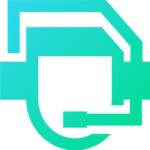

Algorand Assistant
Context
Developers building on Algorand often need real-time guidance for smart contracts, ecosystem-related questions, and tech support. A dedicated AI chatbot built for Algorand can provide seamless assistance, enabling developers to build faster and more effectively.
Expectations
Design and implement an AI-powered Algorand Assistant that:
- Answers developer and ecosystem-related questions about Algorand Blockchain.
- Guides developers in building smart contracts with step-by-step assistance.
- Provides real-time, context-rich information specific to the Algorand ecosystem.
- Supports advanced use cases: Offer tailored recommendations for tools, frameworks, or APIs.
Guidelines
- Research popular AI-powered assistants to identify features that are most effective for developer support.
- Train the AI chatbot with Algorand-specific knowledge, including smart contract development, ecosystem tools, and best practices.
- Ensure the assistant is accessible via multiple platforms (e.g., web app, Discord, Slack) and IDEs (see https://www.continue.dev/).
- Prioritize the accuracy and relevance of responses for developer-focused queries.
Prize: $2500 total; $1500 for first place, $1000 for second place.
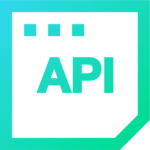

NFT Marketplace with APIs
Context
NFT marketplaces enable creators and collectors to list, sell, and buy NFTs. While many existing platforms provide these functionalities, there is need for a simple and developer-friendly solution with APIs to streamline integration into various applications.
Expectations
Design and implement an NFT marketplace that:
- Provides APIs to list, sell, and buy NFTs on the Algorand blockchain.
- Supports the Algorand Standard Asset (ASA) framework for NFT creation and management.
- Ensures secure and transparent transactions for all marketplace activities.
- Includes basic documentation for developers to integrate the APIs into their applications.
Guidelines
- Research existing NFT marketplaces to identify their core functionalities.
- Utilize Algorand’s Layer-1 smart contract capabilities to handle NFT transactions.
- Focus on building APIs that are simple to use and well-documented.
- Ensure scalability and security in the design of the marketplace infrastructure.
Skeleton Testing Framework
- Allows developers to add some basic testing in the smart contracts written in Algorand Python or Algorand TypeScript
- Sample test scenarios can be provided within the same module
Prize: $2500 total; $1500 for first place, $1000 for second place.
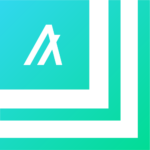

ARC Use Cases
Context
ARC (Algorand Request for Comments) is a design document that provides information to the Algorand community or describes a new feature for Algorand, its processes, or its environment. ARCs include concise technical specifications and rationales for proposed features. The authors of ARCs are responsible for building consensus within the community and documenting dissenting opinions.
Many ARCs include outdated implementation examples or lack sample code using the latest Algorand tools. With PyTEAL now replaced by Python and TypeScript, revamping and expanding these sample implementations can improve developer adoption and understanding while keeping the ecosystem up-to-date.
Expectations
Developers are expected to:
- Create sample code for ARCs using Python and TypeScript: Write example implementations for ARCs with the latest AlgoKit Utils (Algorand Python and Typescript libraries).
- Combine multiple ARCs into reusable smart contracts: Develop examples that integrate ARCs (e.g., ARC-19 and ARC-20) into modular, reusable contracts.
- Revamp outdated ARC example code: Rewrite older ARC implementations (previously written in PyTEAL) into modern Python and TypeScript examples.
Guidelines
- Review the existing ARCs and identify those with outdated or missing implementation examples.
- Use the latest AlgoKit Utils (Algorand Python and Typescript libraries) for all updated implementations.
- Ensure the sample code is well-documented, modular, and easy for developers to adopt.
- Test all implementations for compatibility and ensure they follow best practices on the Algorand blockchain.
- Contribute updated and new sample code to the Algorand Foundation repository to benefit the developer community.
Prize: $2500 total; $1500 for first place, $1000 for second place.
